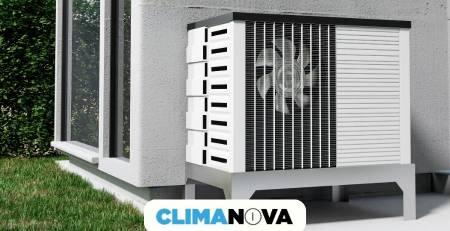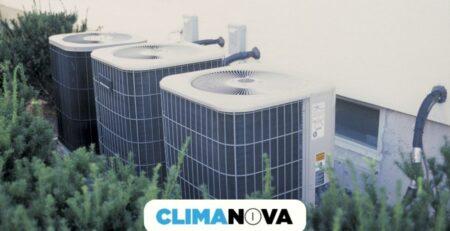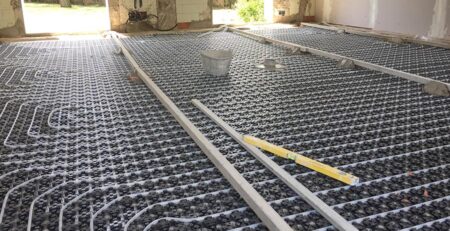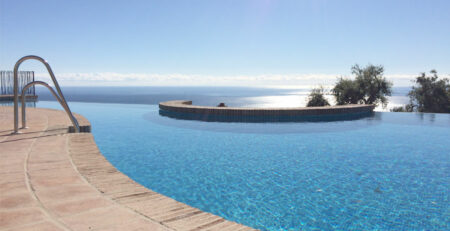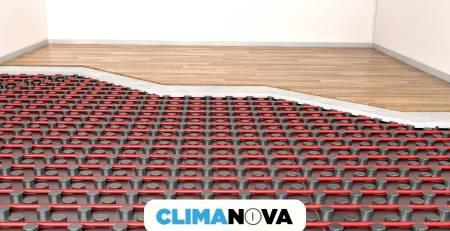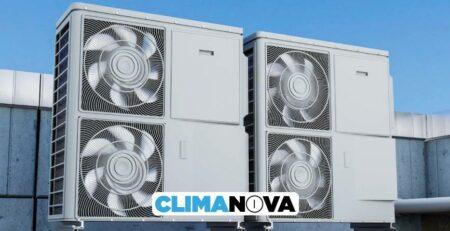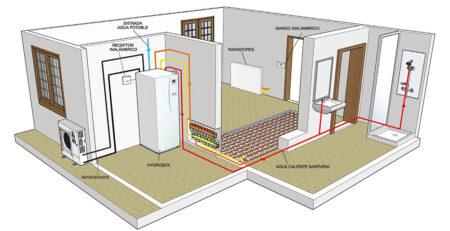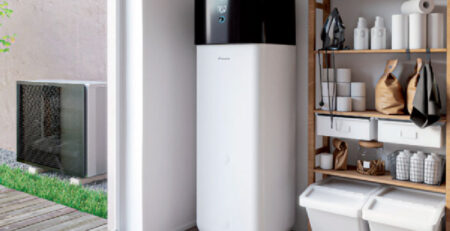If you have a swimming pool and would like to enjoy it for more months of the year, you have probably considered how to heat the water efficiently. Swimming pool heat pumps have become one of the most recommended solutions, both for their low consumption and their performance in temperate climates such as the Costa del Sol.
Perhaps you have heard of this technology, but you still have doubts about how it works, how much it consumes or whether it is suitable for your case. In this article we explain everything you need to know about air source heat pumps to heat swimming pools: how they are installed, what advantages they offer and why more and more homeowners in Marbella, Estepona or Mijas are opting for this solution.
Read on to find out if this is the perfect choice for your pool.
What are swimming pool heat pumps?
Swimming pool heat pumps are systems designed to heat water with reduced energy consumption. They work by harnessing the thermal energy of the outside air, a renewable source, to transfer it to the water. This allows you to enjoy a comfortable temperature for more months of the year, without the need for large energy investments.
These pumps are especially useful in climates such as the Costa del Sol, where the mild climate makes it easy to extend the bathing season. With a heat pump, you can use your pool from spring until well into autumn.
How does a swimming pool heat pump work?
This type of system captures heat from the outside air via an evaporator. This heat is transferred to a refrigerant gas, which is compressed and becomes a hot source. Through an exchanger, this heat is transferred to the pool water. Finally, the refrigerant cools down, returns to its initial state and repeats the cycle.
Swimming pool heat pumps are installed close to the filtering system. They use the water that is already in circulation to heat it without the need for additional pumps. This process is slow but very efficient, and is ideal for keeping the pool at a stable temperature for days or weeks.
The time required to heat a pool depends on its volume and the model of the equipment. Under normal conditions, it can take between 24 and 72 hours. Once the desired temperature is reached, the pump only needs to maintain it, which further reduces electricity consumption.
Advantages of installing a heat pump in the swimming pool
More months of use
A heat pump makes it possible to extend the bathing season from April to October on the Costa del Sol. Even on cool days, the water remains at a good temperature.
High energy efficiency
For every kW of electricity consumed, the pump can generate between 4 and 6 kW of heat. This translates into very low consumption compared to other alternatives.
Ideal for individuals and communities
Both owners of single-family homes as well as communities of neighbours can benefit. Air source heat pumps make it possible to heat large swimming pools with total cost control.
Convenience and automation
Once installed, the pump takes care of maintaining the temperature without the need for daily intervention. As with air source heat pumps for heating and cooling, many models can be remotely controlled.
How much does a heat pump consume?
EConsumption depends on several factors: pool volume, outside temperature, desired temperature and equipment performance.
For example, a 30 m³ pool requires a pump of about 7 to 10 kW. If the efficiency of the equipment (COP) is 5, it will consume only 2 kW of electricity for every 10 kW of heat produced. Assuming a use of 6 hours per day, the monthly cost can be between 40 and 60 € with normal tariffs.
This consumption can be optimised by using a thermal cover for the pool, by programming the pool to be switched on at off-peak hours or by connecting the heat pump to a photovoltaic solar panel system.
What you need to know before you invest
The installation of a heat pump requires prior analysis. Some key aspects:
- Location: To be installed outdoors, in a ventilated area close to the filtration system.
- Climatic conditions: On the Costa del Sol the conditions are ideal.
- COP: The Coefficient of Performance (COP) indicates how much thermal energy it generates for each kW of electricity consumed. The higher it is, the more efficient it is.
- Noise level: Check the noise level of the equipment. Some models are very quiet, ideal for residential areas or if you do not have the possibility of installing it in a place far from the house.
- Maintenance: It is minimal, but it is advisable to make annual revisions.
At Climanova we only carry out installations in the western Costa del Sol area. This allows us to offer a fast, close and fully guaranteed service.
Heat pump technology
Technological advances have significantly improved the performance of these pumps. The most efficient include:
- Inverter technology: Allows the compressor power to be adjusted according to the actual thermal demand. This results in lower consumption and longer service life.
- Titanium heat exchangers: Offer resistance to corrosion and greater durability, especially in salt-treated pools.
- Digital controls: Many models allow operation to be programmed from a mobile app or central console.
- Reversible models: Some equipment can cool the water if desired, very useful in spas or areas with extreme heat.
Installation of heat pumps for swimming pools in Marbella
At Climanova we specialise in heating swimming pools with heat pumps. We work with the best brands on the market to guarantee efficiency, durability and low consumption.
We offer:
- Personalised advice
- Complete and certified installation
- Regular maintenance and repair
- Fast service in Marbella, Estepona, Mijas and nearby locations
We have more than ten years of experience and hundreds of satisfied customers. Our technical team takes care of everything from system design to commissioning.
Frequently asked questions
Yes, although its optimum performance is between 10 °C and 35 °C outside temperature.
Yes, many customers combine the heat pump with solar energy to further reduce electricity consumption.
Depends on volume. On average, one to three days to reach 28 °C.
Modern models have very low sound levels, similar to a quiet air conditioner.
It is minimal. You only need to keep the heat exchanger clean and do an annual check-up.
Do you want to enjoy your pool for longer and with less consumption? Contact us at Climanova and we will prepare an estimate without obligation. Enjoy the comfort and savings offered by a professionally installed heat pump.

